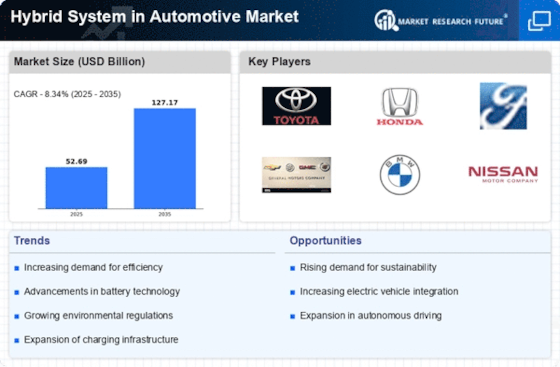Top Industry Leaders in the Hybrid System Automotive Market
*Disclaimer: List of key companies in no particular order
Top listed global companies in the Hybrid System in Automotive industry are:
Aisin Seiki Co., Ltd. (Japan)
GKN plc. (The U.S.)
BorgWarner Inc. (U.S.)
TM4 (Canada)
Punch Powertrain Nv (Belgium)
Dana Holding Corporation (U.S.)
Visedo (Finland)
Magna International Inc. (Canada)
American Axle & Manufacturing, Inc. (U.S.)
Parker Hannifin Corp (U.S.)
JTEKT Corporation (Japan)
Axle Tech International SAS (U.S.)
Magtec (U.K.)
Delphi Automotive LLP (U.K.)
AVTEC LTD (India)
Bridging the Gap by Exploring the Competitive Landscape of the Hybrid System in Automotive Top Players
The automotive industry is undergoing a dramatic shift towards electrification, with hybrid vehicles acting as a crucial stepping stone between traditional gasoline engines and full EVs. This surge in demand has ignited a dynamic competitive landscape within the hybrid system market, with established players battling it out alongside innovative newcomers.
Key Player Strategies:
Traditional Automotive Giants: Toyota, Honda, and Hyundai have maintained their lead through years of experience and brand recognition. Their focus lies on refining existing hybrid technology, optimizing fuel efficiency, and expanding their hybrid offerings across various segments. Toyota’s Prius family remains a benchmark, while Honda’s Insight and Hyundai’s Ioniq cater to different budgets and preferences.
European Challengers: Volkswagen Group (VW) has emerged as a strong contender with its modular electrification platform, MEB, powering several hybrid models across Audi, Skoda, and SEAT. PSA Group (Peugeot-Citroën) has partnered with Mitsubishi to leverage hybrid expertise and introduce competitive offerings like the Peugeot 3008 Hybrid. These players emphasize scalability and platform-sharing to lower costs and widen their reach.
Asian Disruptors: Chinese firms like BYD and Geely are making waves with their cost-effective hybrid models. BYD, in particular, boasts advanced battery technology and vertical integration, which translates to competitive pricing and rapid market penetration. These players target budget-conscious consumers and focus on value proposition rather than established brand image.
Technology Startups: Tesla, despite not offering dedicated hybrids, has significantly influenced the market with its focus on performance and cutting-edge battery technology. Other startups like Lucid Motors and Rivian are entering the fray with luxury plug-in hybrid SUVs, emphasizing high-end features and range extension capabilities. These players aim to disrupt the market with technological innovation and differentiated user experiences.
Factors for Market Share Analysis:
Regional Variations: Government regulations and fuel price structures play a significant role. Europe’s stringent emission standards have fueled hybrid adoption, while the U.S. market remains more price-sensitive. Emerging markets like China and India offer immense potential due to their focus on reducing pollution and energy dependence.
Battery Technology Advancements: Range, charging time, and battery degradation directly impact consumer preference. Companies like LG Chem, Samsung SDI, and CATL are constantly pushing the boundaries of battery technology, creating opportunities for differentiation and cost reduction.
Hybrid System Types: Mild hybrids, full hybrids, and plug-in hybrids cater to different driving needs and preferences. Analyzing market share across these segments is crucial, as consumer demand evolves and technology improves.
Pricing and Affordability: The cost premium associated with hybrid technology remains a barrier for some buyers. Balancing performance, features, and price point is critical for success, especially in budget-conscious markets.
New and Emerging Trends:
48V Mild Hybrids: These offer lower costs and simpler integration, making them attractive for entry-level and mainstream vehicles. The rise of 48V systems presents opportunities for component suppliers and system integrators.
Plug-in Hybrid Evolution: Extended electric range and faster charging capabilities are becoming increasingly sought-after, blurring the lines between hybrids and EVs. This trend demands innovation in battery management and charging infrastructure.
Hybrid Powertrain Diversification: Hybrid systems are being combined with other technologies like diesel engines and hydrogen fuel cells to cater to specific applications and regional needs. This diversification opens doors for collaboration and niche market opportunities.
Overall Competitive Scenario:
The hybrid system market is characterized by intense competition across various fronts. Established players leverage their experience and brand recognition, while newcomers bring technological innovation and cost-effective solutions. Regional variations, evolving consumer preferences, and technological advancements demand adaptability and strategic partnerships.
To stay ahead in this dynamic race, players must:
Continuously refine existing hybrid technology while keeping pace with battery advancements.
Adapt to regional variations and address specific market needs with targeted strategies.
Explore collaborations and partnerships to leverage expertise and overcome technical challenges.
Prioritize affordability and optimize pricing to make hybrid technology accessible to a wider audience.
By navigating these complexities and responding to evolving trends, companies can solidify their position in the hybrid system market and pave the way for a greener future for the automotive industry.
This analysis provides a snapshot of the current competitive landscape and key trends. Stay tuned for further insights on specific technologies, regional dynamics, and the impact of disruptive forces on the hybrid system market.
Latest Company Updates:
Aisin Seiki Co., Ltd. (Japan):
- December 2023: Announced collaboration with Toyota to develop and produce eAxle for hybrid and electric vehicles. (Source: Aisin Seiki press release)
GKN plc. (U.S.):
- October 2023: Launched eDrive systems for commercial vehicles, focusing on hybrid buses and trucks. (Source: GKN Automotive press release)
BorgWarner Inc. (U.S.):
- December 2023: Showcased advanced eBooster technology for mild-hybrid applications at CES 2024. (Source: BorgWarner press release)
Dana Holding Corporation (U.S.):
- December 2023: Launched Spicer Electrified eGearbox for plug-in hybrid and electric vehicles. (Source: Dana Holding Corporation press release)
Visedo (Finland):
- December 2023: Unveiled new battery management system for hybrid and electric vehicles with improved safety and performance. (Source: Visedo press release)










